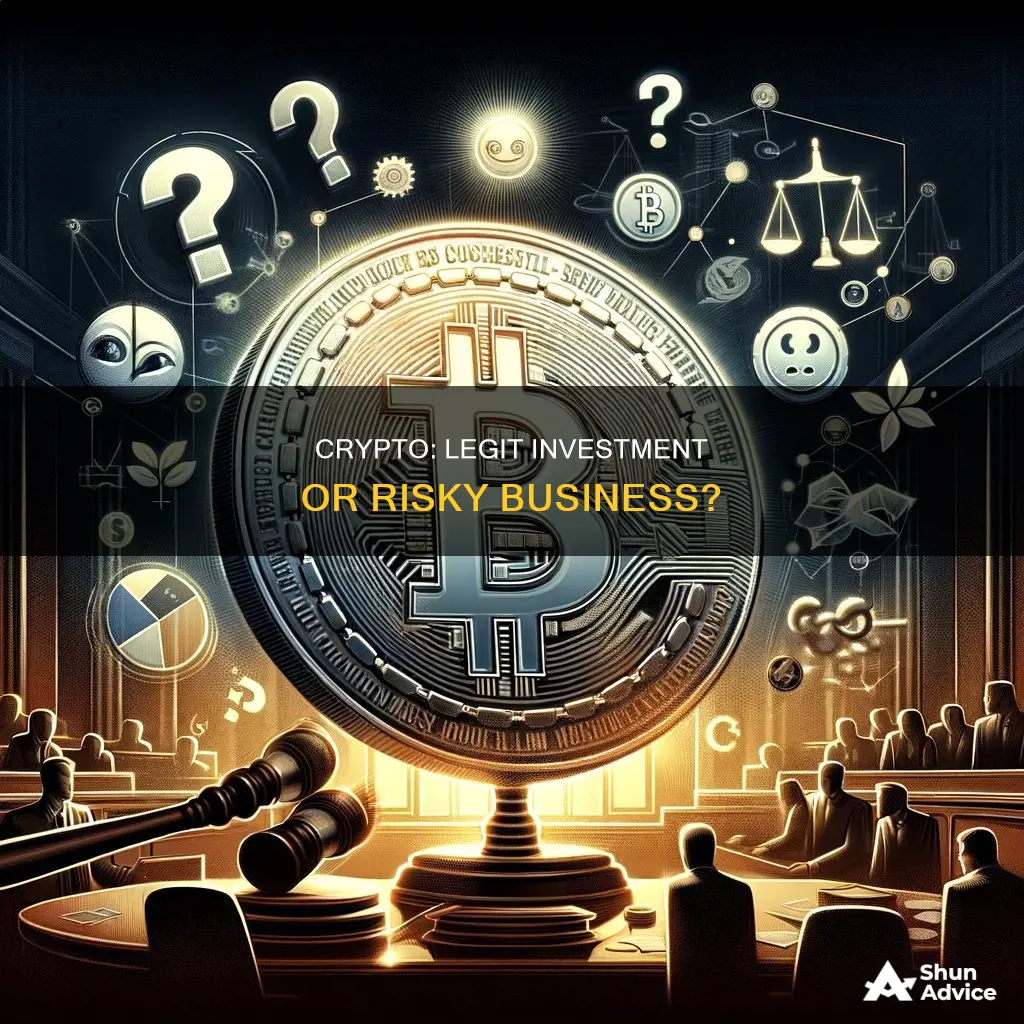
Cryptocurrency is a digital currency that exists electronically and is stored in a digital wallet. It is not backed by a government and is therefore not insured by a government like US dollars are. This means that if something happens to your cryptocurrency funds, the government has no obligation to help you recover them. The value of cryptocurrency is also highly volatile and can change rapidly, even within the hour.
Because of the nature of cryptocurrency, it has become a popular avenue for scams and theft. Scammers use cryptocurrencies because they are not easily recovered, and crypto can be sent overseas quickly with limited oversight. Scammers often pose as legitimate businesses, government agencies, or even love interests to trick people into sending them cryptocurrency. They may also create fake cryptocurrency trading platforms or fake versions of official crypto wallets to trick unsuspecting victims.
However, despite the risks, cryptocurrency can be a legitimate investment. To avoid scams, it is important to do your research, only download apps from official platforms, and be wary of social media advertisements and unsolicited investment advice.
| Characteristics | Values |
|---|---|
| Volatility | Cryptocurrency is a very high-risk and volatile investment. The value can go up or down quickly and there are no guaranteed returns. |
| Recoverability | Cryptocurrency is not insured by the government. If something happens to your account or funds, the government has no obligation to help you recover them. |
| Scams | Scams are common in the cryptocurrency space. Scammers use various tactics to trick people into sending them cryptocurrency, such as fake celebrity endorsements, investment schemes, phishing, and blackmail. |
| Anonymity | Cryptocurrency transactions are typically recorded on a public ledger called a "blockchain", but it is still possible to use cryptocurrency anonymously. |
| Fees | Cryptocurrency transactions do not incur traditional transaction fees charged by banks. |
| Accessibility | You can buy cryptocurrency through an exchange, an app, a website, or an ATM. |
| Storage | Cryptocurrency is stored in a digital wallet, which can be online, on your computer, or on an external hard drive. |
What You'll Learn

Cryptocurrency's volatile nature makes it a risky investment
Cryptocurrency is a rapidly growing market, but it is also a highly volatile one. This volatility is reflected in the significant price swings that occur frequently in the world of cryptocurrency. While most investors accept that crypto asset prices can fluctuate, the extreme pace of these changes sets crypto apart from traditional financial markets.
The nature of crypto
Cryptocurrency is a type of digital currency that generally exists only electronically. It is not backed by governments or central authorities, and its value is based on speculation and how much people are willing to trade for it. This means that its market value is based on educated guesswork, making it a speculative asset.
Volatility in financial markets
Volatility refers to how much the price of an asset has increased or decreased over time. High volatility is indicated by larger and more frequent price movements, and this volatility is a key feature of the crypto market. Crypto is still a relatively new asset class, and its high growth phase is characterised by rapid price changes.
Risks of investing in crypto
The more volatile and unpredictable an asset is, the riskier it is considered as an investment. Crypto is riskier than traditional asset classes like stocks and bonds, which typically see less dramatic price movements. The crypto market is also immature, with less liquidity and depth to accommodate larger traders. This means that large trades can have a significant impact on prices.
Supply and demand
The distribution between supply and demand also plays a major role in the volatility of crypto prices. Bitcoin, for example, has a limited supply of 21 million coins. When demand increases, it can put upward pressure on prices, increasing volatility. Large holders, known as "whales", can further compound this pressure by buying or selling significant quantities, potentially sending prices soaring or tumbling.
Investor sentiment
The crypto market is heavily influenced by investor sentiment. Positive or negative views can spread like a contagion due to the psychology of the typical crypto investor, who is often an individual or retail investor that is less informed and more impressionable than more seasoned traditional investors. This can lead to FOMO (Fear of Missing Out), creating a positive feedback loop with high demand for an asset, causing major price movements.
Regulation
The lack of clear regulation in the crypto market is another factor contributing to its volatility. Without the interventions of exchanges to dampen volatility, as seen in traditional markets, crypto's free-market dynamics are susceptible to high price fluctuations.
Scams and theft
The rise of cryptocurrency has also led to an increase in scams and theft. Scammers use a variety of tactics, including investment schemes, fake celebrity endorsements, rug pull scams, phishing scams, and more. Cryptocurrency is also harder to recover in the event of theft since it is not backed by a central authority like a bank.
In conclusion, the volatile nature of cryptocurrency makes it a risky investment. The extreme price fluctuations, speculative nature, and lack of regulation all contribute to the high level of risk associated with crypto. While there is the potential for greater returns, there is also the possibility of significant losses.
My Bitcoin Investment: How Much Did I Risk?
You may want to see also

Crypto scams are common, and they come in various forms
- Investment Scams: Scammers pretend to be "investment managers" or celebrities and promise to help people grow their money if they transfer their cryptocurrency to the scammer's account. However, instead of investing the funds, the scammers steal them. These scams often involve fake celebrity endorsements, with scammers using real photos of celebrities on fake accounts, ads, or articles to make it appear as though the celebrity is promoting the investment.
- Pump-and-Dump Schemes: Scammers hype up a particular coin or token through emails or social media, causing a rush of traders to buy, which drives up the price. Once the price rises, the scammers sell their holdings, causing the price to crash, leaving other investors with losses.
- Phishing Scams: Scammers send emails with malicious links that direct victims to fake websites designed to steal their login credentials, private keys, or other sensitive information. They may also impersonate well-known companies or government agencies to trick people into clicking the links.
- Fake Crypto Exchanges and Wallets: Scammers create fake cryptocurrency trading platforms or fake versions of official crypto wallets. These fake websites often have similar domain names and designs to legitimate sites, making it hard to tell the difference. People who invest through these fake platforms may initially be able to withdraw small amounts, but when they try to withdraw larger sums, the site shuts down or declines the request.
- Blackmail and Extortion Scams: Scammers send emails claiming to have compromising information about the victim and threaten to expose it unless they share their private keys or send cryptocurrency.
- Fake Celebrity Endorsements: Scammers pose as celebrities, businesspeople, or influencers to capture attention. They may sell non-existent cryptocurrencies to novice investors, promising to match or multiply any cryptocurrency sent to them.
- Cloud Mining Scams: These scams involve companies that offer to rent mining hardware in exchange for a fee and a share of the revenue. However, many of these companies are fraudulent, and people end up losing money instead of making it.
- Fraudulent Initial Coin Offerings (ICOs): Criminals create fake start-up crypto companies and use elaborate schemes, such as renting fake offices and creating high-end marketing materials, to deceive investors into sending them cryptocurrency.
- Man-in-the-Middle Attacks: Scammers intercept sensitive information, such as passwords and cryptocurrency wallet keys, when users log in to their cryptocurrency accounts on public networks or unsecured Wi-Fi connections.
- Social Media Giveaway Scams: Scammers post fraudulent offers on social media, promising bitcoin giveaways. Victims are directed to a fake site where they are asked to make a payment to verify their account, resulting in the loss of their money or personal information.
- Employment Scams: Scammers impersonate recruiters or job seekers to gain access to cryptocurrency accounts. They may offer jobs that require an upfront payment in cryptocurrency or trick people into buying fake crypto coins or tokens.
These are just some examples of the many types of crypto scams out there. It's important for individuals interested in investing in cryptocurrency to be vigilant, educate themselves about the various scams, and take precautions to protect their investments.
Junk Silver Coins: Smart Investment or Not?
You may want to see also

Crypto is not insured by the Federal Deposit Insurance Corporation
Investing in cryptocurrency has become an increasingly popular option, with people using it for quick payments, to avoid transaction fees charged by traditional banks, or because it offers some anonymity. However, it is important to note that cryptocurrency is not insured by the Federal Deposit Insurance Corporation (FDIC). This means that if something happens to your cryptocurrency funds or wallet, the government has no obligation to step in and help you recover your money.
The FDIC only insures deposits held in insured banks and savings associations, and only in the event of a bank's failure. Crypto assets are not considered deposits and are not covered by FDIC insurance. This is because cryptocurrency is not backed by a central authority like a bank but instead uses blockchain technology for verification. As a result, it is harder to recover funds in the event of theft or fraud.
The lack of FDIC insurance for cryptocurrency highlights the risks associated with investing in crypto assets. The crypto market has experienced significant volatility, with frequent fluctuations in the value of cryptocurrencies. This volatility can lead to substantial gains or losses for investors, and there is no guarantee that the value of a cryptocurrency will increase or even stabilize.
Additionally, the absence of FDIC insurance means that individuals bear the full risk of loss if their cryptocurrency wallet is compromised or their exchange platform goes out of business. In such cases, there is no government protection or recourse to recover lost funds. This is a significant difference from traditional currency held in FDIC-insured bank accounts, where depositors are protected up to certain limits.
The risks associated with cryptocurrency investments underscore the importance of conducting thorough research and due diligence before investing. While crypto assets can offer potential gains, investors must be aware of the volatility and lack of government protection in this space. It is crucial to understand the unique characteristics and risks of cryptocurrency before making any investment decisions.
The Rich and Bitcoin: A Lucrative Investment Strategy?
You may want to see also

Crypto wallets can be hacked, and your funds can be stolen
Crypto wallets can indeed be hacked, and your funds can be stolen. In the first seven months of 2022, $1.9 billion worth of cryptocurrencies were stolen, a 60% increase from the previous year. This is often done through malware, such as the Android Trojan "Sharkbot", which steals money from crypto and banking apps on compromised devices. Other examples of malware that target cryptocurrency wallets include Xenomorph, Octo, and Sova.
Hackers also exploit the connections between crypto wallets or between the crypto wallet and the backend service supporting the app. For example, a white hat hacker found that 99% of the mobile apps of large global financial institutions and cryptocurrency companies contained easily harvestable hardcoded API keys and tokens, usernames, and passwords.
Another way that hackers steal crypto is through "over-the-shoulder attacks", where they physically look over someone's shoulder as they enter their passphrase or key into a crypto wallet app. This can be avoided by simply being aware of your surroundings when entering sensitive information. Keylogging malware can also be used to digitally log a user's keystrokes as they enter their passphrase or key. Overlay attacks, another form of identity malware, superimpose a screen or use a fake screen to trick the user into entering their passphrase or key into a malicious screen or entry field inside the crypto wallet app.
To protect your crypto, it is recommended to use non-custodial cold wallets, which are wallets that are not connected to the internet. Examples of cold storage methods include a USB thumb drive with encryption and a piece of paper with the keys written on it stored in a safe. However, it is important to note that USB connections can degrade over time, and paper wallets can be easily damaged. Additionally, once a cold storage device is connected to the internet, it becomes vulnerable to hacking.
Other ways to protect your crypto include using strong passwords, only using secured connections or VPNs, choosing safe storage, and never sharing your private keys with anyone else.
A Minor's Guide to Bitcoin Investment
You may want to see also

Crypto investments are not backed by governments
Cryptocurrency accounts are not insured by governments in the same way that traditional, regulated bank accounts are. If something happens to your cryptocurrency funds, the government has no obligation to step in and help you recover your money. For example, if the company providing storage for your wallet goes out of business or is hacked, you're unlikely to get your money back.
The decentralised nature of cryptocurrencies means they are outside the direct control of central banks and governments. Cryptocurrencies are not issued or endorsed by a country as legal tender, and they are not linked to the value of a commodity, such as gold, or a fiat currency, such as the US dollar.
This lack of government backing and decentralised nature of cryptocurrencies can be a concern for investors. If something goes wrong, there may be no recourse to get your money back. Cryptocurrencies are also highly volatile, and their value can fluctuate significantly, even within the space of an hour.
Additionally, the anonymous and decentralised nature of cryptocurrencies can make them attractive for criminal activities, such as money laundering, and for circumventing capital controls. This further increases the risk of investing in cryptocurrencies and can lead to governments treating them with suspicion or even banning them outright.
While some countries, like El Salvador and the Central African Republic, have recognised Bitcoin as legal tender, others, like China, have banned cryptocurrencies altogether. The lack of government backing for cryptocurrencies can, therefore, create regulatory uncertainty and increase the risk for investors.
Coin Collection: Worthy Investment or Money Pit?
You may want to see also
Frequently asked questions
Cryptocurrency is a type of digital currency that exists electronically. People use it for quick payments, to avoid transaction fees charged by traditional banks, or because it offers some anonymity. Cryptocurrency is stored in a digital wallet and can be purchased through an exchange, an app, a website, or an ATM.
Cryptocurrency accounts are not backed by a government and are not insured by the government if something happens to your account or funds. The value of cryptocurrency changes constantly and tends to be more volatile than traditional investments.
Crypto is a very high-risk and volatile investment. The value can go up or down quickly and there are no guaranteed returns. If you lose your money to a crypto scam, it is likely gone. If you choose to buy crypto, only invest what you can afford to lose.
Some red flags of crypto scams include someone you don't know contacting you with investment advice, pressure to take action (e.g. transfer crypto off your current exchange), offers of "guaranteed" high returns or "free" money, little paper trail for investments, and strange tokens appearing in your digital wallet.
Some common types of crypto scams include phishing scams, pump and dump schemes, fake celebrity endorsements, blackmail and extortion scams, fraudulent initial coin offerings (ICOs), and fake trading platforms or wallets.







